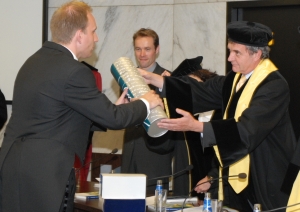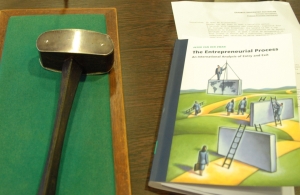The Entrepreneurial Process: An International Analysis of Entry and Exit
 Academics and policymakers agree that entrepreneurship is positively related to a region’s economic prosperity. Countries that are munificent in terms of entrepreneurial resources and opportunities are argued to have a forward position in terms of job creation, competitiveness, and, ultimately, economic growth. Entrepreneurship may also play a role in the recovery process of countries when they are in periods of economic downturn.
Academics and policymakers agree that entrepreneurship is positively related to a region’s economic prosperity. Countries that are munificent in terms of entrepreneurial resources and opportunities are argued to have a forward position in terms of job creation, competitiveness, and, ultimately, economic growth. Entrepreneurship may also play a role in the recovery process of countries when they are in periods of economic downturn.
From a policy point of view, there has been much interest in the conditions under which individuals decide to pursue or exit from entrepreneurial activities. In his thesis The Entrepreneurial Process: An International Analysis of Entry and Exit, Peter van der Zwan attempts to reveal these conditions. The findings may then be useful for policymakers to exert influence on the entrepreneurial position of individuals, regions, or countries.
The results indicate that people with pessimistic views about the administrative start-up environment are discouraged in having intentions or undertaking attempts to set up their own businesses (particularly in Europe). The focus can be on making information more transparent and readily available to potential entrepreneurs. Regarding the exit side of entrepreneurship, exit before start-up and exit after business start-up are related to different characteristics. For example, urbanization is negatively related to exit before start-up and positively related to exit after start-up. This finding points at the presence of overoptimistic entrepreneurs and strong selection mechanisms in these urban areas.
The process view of entrepreneurship, central to this thesis, is of particular interest for government policy. Governments may intervene at positions in the entrepreneurial process where certain characteristics, such as perceptions about the entrepreneurial environment, hinder the entrepreneurial progress of individuals. Hence, it is important to know whether and where these perceptions play a role in the advancement in the entrepreneurial process. Governments can then intervene at specific positions on the “entrepreneurial ladder” where (potential) entrepreneurs are hindered in their progress.
Peter van der Zwan defended his dissertation on May 26 2011 at Erasmus School of Economics, Erasmus University. His promoters were <link people _blank>Prof.dr. Patrick Groenen and <link people _blank>Prof.dr. Roy Thurik. Other members of the Doctoral Committee were Prof.dr. Richard Paap, Prof.dr. Enrico Pennings, and Prof.dr. Mirjam van Praag.
About Peter van der Zwan
Peter van der Zwan (1984) finished his grammar school education in Den Haag in 2002 (Christelijk Gymnasium Sorghvliet). He graduated cum laude in Econometrics and Management Science at the Erasmus School of Economics in 2007. Subsequently, he started his PhD in Economics under the supervision of Professor Roy Thurik, again in Rotterdam. During his four years of research, Peter has co-authored a wide range of articles on the determinants of entrepreneurial engagement and exit. Several of them have been published in international journals such as Industrial and Corporate Change, Journal of Economic Psychology, Journal of Evolutionary Economics, and Small Business Economics. Peter presented his work at various international conferences. Currently, he is employed at the Erasmus School of Economics and EIM Business & Policy Research.
Abstract of The Entrepreneurial Process: An International Analysis of Entry and Exit
 This thesis deals with the entrepreneurial process from an international perspective. The first part explores which people decide to enter entrepreneurship. A distinction is made between two modes of entrepreneurial entry: taking over an existing firm and starting a new firm. The second part focuses on the exit side and examines the determinants of exit before and exit after business start-up. In addition, the decision to re-enter entrepreneurship after having experienced an entrepreneurial exit is analysed in this second part.
This thesis deals with the entrepreneurial process from an international perspective. The first part explores which people decide to enter entrepreneurship. A distinction is made between two modes of entrepreneurial entry: taking over an existing firm and starting a new firm. The second part focuses on the exit side and examines the determinants of exit before and exit after business start-up. In addition, the decision to re-enter entrepreneurship after having experienced an entrepreneurial exit is analysed in this second part.
This thesis is of particular interest to policymakers, partly due to its dynamic approach. That is, this thesis distinguishes between several stages that make up the decision to become an entrepreneur. The stages range from no entrepreneurial activity to intentional, nascent, young, and established entrepreneurship (the “entrepreneurial ladder”). The conclusions of this thesis may help governments to intervene at positions on the entrepreneurial ladder where certain characteristics, such as perceptions about the entrepreneurial environment, hinder entrepreneurial progress or where regions lag behind.
Findings indicate that people with pessimistic views about the administrative start-up environment are discouraged in having intentions or undertaking attempts to set up their own businesses (particularly in Europe). Policies should be aimed at tackling inflated perceptions of administrative barriers (in case of misperceptions of the environment) or directly lowering these barriers. Exit before start-up and exit after business start-up have different determinants. For example, urbanization is negatively related to exit before start-up and positively related to exit after start-up. This finding points at the presence of overoptimistic entrepreneurs and strong selection mechanisms in these areas. Furthermore, individuals are inclined to enter the entrepreneurial process again after having experienced an exit. This finding holds true for positive as well as negative exit experiences.
Download 'The Entrepreneurial Process: An International Analysis of Entry and Exit' at RePub


